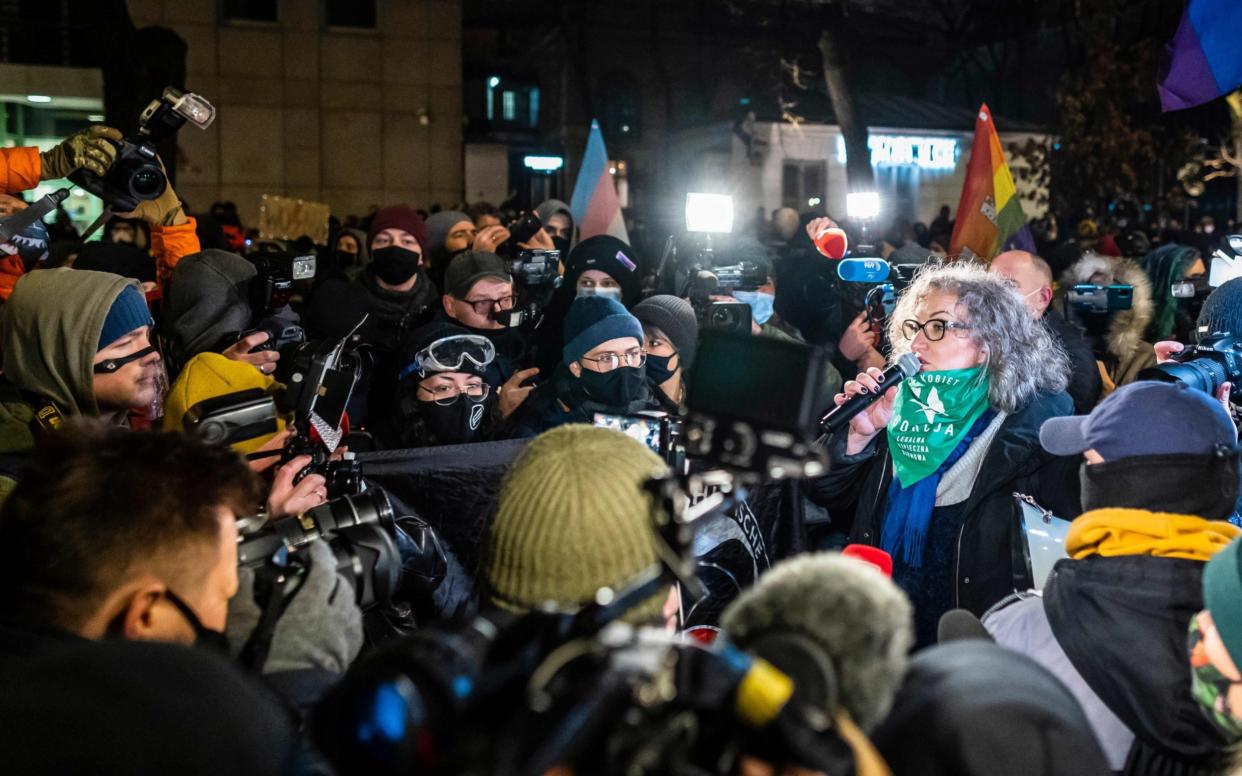'Now we want everything': Polish activist Marta Lempart vows to continue anti-abortion rebellion

Poland’s Women’s Strike movement took to the streets on Monday in the latest of a series of nationwide protests over the introduction of an almost complete ban on abortion, with Marta Lempart once again leading the way.
The softly spoken Ms Lempart, a 41-year-old lawyer, has shot from relative obscurity to become one of the most recognised faces in Poland – but at a considerable personal cost.
In the course of protests she has been pepper sprayed and struck with a police baton. She also faces a number of criminal charges including causing an epidemiological threat during a pandemic by organising a demonstration and insulting a police officer, in a case against her that the US State Department has said “are part and parcel of constricting space for civil society in Poland”.
Speaking to The Telegraph just before the march to mark International Women's Day, Ms Lempart described her fear that she might suffer the same fate as Pawel Adamowicz, the liberal mayor of the northern Polish city of Gdansk, who was stabbed to death by a lone attacker in front of hundreds during a charity concert in Jan 2019.
A fierce government critic, Adamowicz had been subjected to a barrage of criticism by state-owned television before his death; an onslaught which his family and supporters believe cultivated an atmosphere of hate that contributed to his death.
“They killed him by using TV propaganda,” Ms Lempart said. “They built up an atmosphere that would provoke someone, trigger someone to do something, and that is what happened. Now they are using tonnes and tonnes of material against me."
She said: “Once they got the results of my [positive] Covid-19 tests and did a 90-minute special on how I’m organising these protests even though I have Covid-19, and basically the general narrative was that it was good I had coronavirus and maybe I would die from it. And that is just one of many examples.”
The government rejects any allegations that it is pushing a hate campaign, but public television, over which it has influence, has not shied away from criticising Ms Lempart.
On Monday, Ms Lempart and fellow protestors brought bus, tram and car rush-hour traffic to a halt when they occupied one of Warsaw's main intersections.
“This is our city, this is our right to march. It is not the city of Kaczynski [the Law and Justice leader],” she told the crowd. “Gentleman, we are satisfied with gifts of flowers and tights, but now we want everything,” she added, in reference to the date.
Marching under the slogan “Women’s Day without compromise” the demonstrators were forced to change location of their meeting point owing to a huge police presence.
The police have said the demonstration is illegal and they ordered the protesters to disperse.
The Warsaw demonstration was one of at least 40 planned by Women’s Strike across the country on Monday.
Under Ms Lempart's leadership, Women’s Strike has become a potent political force that poses a serious challenge to Law and Justice, Poland’s socially conservative governing party that has always taken pride in its strong links to the Catholic Church and desire to uphold traditional values.

Founded in 2016, the organisation surged to prominence following a ruling in October by one of Poland’s top court’s that paved the way to an almost complete ban on abortion in the country. The movement has rallied thousands to its cause by organising dozens of demonstrations that have brought towns and cities across Poland to a standstill.
The scale of the protests, which have spread to the small Polish towns that Law and Justice regards as its heartland, and the fact that they attract a cross-section of mostly young voters, means that the government cannot easily dismiss them as the outbursts of liberal, elite malcontents.
There is also the protests’ vehemence. Ms Lempart says that earlier anti-government demonstrations that had taken place on weekends were easily dismissed by the authorities, so when Women’s Strike was born, she wanted a radical change of tack.
Protests would be held on working days, during rush hours and streets would be blocked. Peaceful disruption was the goal.
“We will do anything that is needed,” she told The Telegraph. “The government knows that most Poles want legal abortion, so we cannot have a situation when parliament supports something that is against the will of the people. So they should be afraid of us."
She added: "They can’t be convinced by arguments so they need to be scared, and this is our job. To scare them and make them so afraid that they will not dare to put something on the table that is against the people.”
This determination to confront authority, says Ms Lempart, stems from her upbringing.

“It’s not a surprise that I’m doing what I’m doing now because I’m a second generation rebel,” she said. “My mother is the rebel in the family. She is a speech therapist who managed to make an outdated special-needs school system in Poland collapse. She faced a huge backlash when she dragged this ancient system into the 20th century. She’s a fighter.”
After Law and Justice came into office in 2015, Ms Lempart became involved in opposition movements, but it was only after the government began to try and tighten the abortion law that she fully embraced political activism.
“I was giving a speech in Wroclaw, which is where I come from, and I called for a women’s strike on Oct 3, 2016,” she said. “I then put a page on Facebook and ‘tricked’ people into joining the Women’s Strike movement by asking them where they wanted to protest. The rest is history.”
The pressure and fear she says she has to deal with has resulted in weekly psychological counselling, but despite this Ms Lempart says she has no plans to step down.
“Somebody has to do it, and I think my character flaws come with positive traits in certain situations,” she said.
“I don’t treat danger seriously, and that’s a flaw because I should have a greater sense of self-preservation, but this is good because it makes me brave and this is what I have to be right now.”

